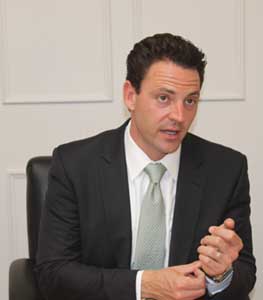
“Someone who can rule and should rule. Centuries come and go without a person like that coming into the world.” – Ser Jorah Mormont, Game of Thrones
When Nathan Fletcher left the Republican Party, I wondered (in this space) if he was trying to light a fire under his candidacy or start a centrist independent movement.
There is little doubt that Fletcher has sparked his mayoral candidacy. His defection garnered national attention, with mentions in a column by David Brooks and on MSNBC, the left’s favorite conservative writer and network. Mayoral election polls that previously had Fletcher in the low teens showed him neck and neck with Councilman Carl DeMaio in the high 20s. Whether Fletcher’s surge reflects a spike in name recognition or support is an interesting question, but not half as interesting as whether others could join his movement.
Last month, more than 30 business owners joined, by renouncing their party affiliation in solidarity with, if not outright support of, the Fletcher campaign. They could have written Fletcher checks without denying past affiliations, so it’s reasonable to assume they have a message beyond “Nathan for Mayor”. In the simplest terms, they appear to be saying “there is money for moderates in San Diego.” Which raises the question – which candidates could join the Fletcher Party?
The most obvious, should he choose to accept the Fletcher mantle, is former San Diego City Council President Scott Peters. In the race for California’s 52nd Congressional District, he is trying to find room between Rep. Brian Bilbray, the Republican incumbent, and former Assemblywoman Lori Saldaña, the progressive Democrat. Polls showing Saldaña leading him nearly 3:1 among Democrats, must make the Fletcher movement enticing.
Another potential Fletcher-ian is Andrew Poat. While District 3 Councilman Todd Gloria hasn’t yet cruised to his uncontested second term, there is no shortage of chatter about his successor. As a Republican turned Independent, Poat is a perfect fit for the Fletcher Party, though the demographics will provide a hard slog against a progressive like Stephen Whitburn. Robert Gleason, the gay man running the airport authority for a Republican mayor, might also have enough bipartisan appeal to chuck both parties and win a council race.
At the county level, Ron Roberts was a Fletcher moderate before there were Fletcher moderates. He courted the LGBT vote early in his career, and used the goodwill he engendered to ward off progressive challengers. As a Republican in technically non-partisan elections, Roberts has successfully used flyers that promote the inference that he is a Democratic choice while cleaning up on the Republicans side. Roberts could probably teach Fletcher a thing or two about the middle, and might actually give more than got if he joined up, particularly if he chooses not to run in 2014.
Party Fletcher could also recruit in heavily partisan districts, particularly where candidates have alienated part of their base. In the California 51st, no Republican is expected to survive the jungle primary, much less make the general, leaving state Sen. Juan Vargas and former Sen. Denise Moreno Ducheny to face off again in November.
Anyone looking to join team Fletcher faces a few questions. Will Fletcher accept them? An Independent run could easily be stymied by a negative Fletcher comment. Can they get party leaders to support, or not hinder, their general election bid? In November, it’s unlikely that the Republican Party will attack Fletcher when the alternative is Filner. Ditto for the Democrats if the other option is DeMaio. That may not be true of every race. Do they have a compelling personal narrative that fits Independence? Let’s face it – it is Fletcher’s story as a Marine and father who felt a duty to continued service and took a principled stance on equality that pulls it all together (along with great fundraising). He may be that leader who can and should rule. If he can make it through the primary.











Glad to see the important new role of independents being recognized. My campaign contributions and votes have been on both sides of the aisle for a long time – I have no problem supporting President Obama and Mayor Sanders at the the same time – and I am excited that California voters approved the “open-primary” system for our congressional and state legislative races.